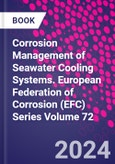Corrosion Management of Seawater Cooling Systems, Volume 71 provides an overview on main seawater heat exchanger systems, different forms of corrosion, biocide treatments, corrosion, scale inhibitors, materials used, coatings and cathodic protection, maintenance, and monitoring and control. The book will be a valuable reference resource for academics, technicians and engineers who are interested in the corrosion management of seawater cooling systems. The evolution of practices in terms of sustainability, materials choice, treatment selection and changes to regulations have demonstrated the need to establish this new guide on recommended best practices that support corrosion management and the development of seawater heat exchangers.
Seawater is considered an attractive resource for utilities in many industries such as power plants, refineries and chemical plants. Seawater cooling systems are used in heat exchangers, in once-through cooling water systems, and for recirculating cooling water systems. The metallurgy and materials used in these facilities need to be compatible with seawater and allow good corrosion control. As seawater composition and suspended solids can cause corrosion, scaling, fouling, microbiological growth and macrofouling problems, this book is a necessary addition to the conversation.
Please Note: This is an On Demand product, delivery may take up to 11 working days after payment has been received.
Table of Contents
1. Introduction2. Main seawater heat exchangers systems
3. Seawater environment: aggressivity, living organisms, deposits and scale formation, pre-treatment
4. Different forms of corrosion in sea water heat exchangers systems
5. Biocide treatments how they can affect the corrosion resistance
6. Corrosion and scale inhibitors
7. Materials used
8. Corrosion protection
9. Maintenance and tube cleaning
10. Control and monitoring, inspection techniques
Authors
Francois Ropital IFP Energies nouvelles, Electrochemistry and Materials, Solaize, France. Fran�ois Ropital is a materials engineer from the National Institute of Applied Sciences in Lyon (1980), Doctor of the �cole Nationale Sup�rieure des Mines de Saint-�tienne in Chemical Engineering (1984) and HDR from the University of Paris VI in Applied Chemistry and Industrial Process Engineering (2002). He works at IFP �nergies nouvelles on the behavior of materials for energy technologies within the Applied Physico-Chemistry and Mechanics Department.From 2010 to 2015 Francois Ropital was editor-in-chief of the review "Oil and Gas Science and Technology - Revue d'IFP Energies nouvelles". Since 2019, he has been an associate university professor (PAST) at INSA-Lyon, in the Department of Materials Science and Engineering. He is also Chairman of the Working Party "Corrosion in refinery and petrochemistry" the European Federation of Corrosion (EFC). Valerie Bour Beucler Senior Industry Technical Consultant, and Associate Professor at the IFP School (ENEP Poly), Chairman of the CEFRACOR "corrosion inhibitors" working party..
Dr Valerie Bour Beucler is a Senior Industry Technical Consultant, and Associate Professor at the IFP School (ENEP Poly). Valerie holds a master's degree in materials science and engineering, and a doctorate from the University of Nancy on the study of a family of organic steel corrosion inhibitors. Valerie then completed a post-doctorate at the Elf Atochem research centre. Before her teaching post she spent many years in industry, as a corrosion manager at CIRSEE at Lyonnaise des Eaux and then over 26 years as an expert in water treatment (cooling water systems and steam generators) at Nalco. Valerie is currently the Chairman of the CEFRACOR "corrosion inhibitors" working party.
Antoine Surbled AMPP member, French Corrosion Society (CEFRACOR) member, Consultant in materials and corrosion sciences and technology,.Antoine Surbled is a material and corrosion engineer from the Conservatoire National des Arts et M�tiers (CNAM) in Paris (1972), DEA in electrochemistry from the university of Paris VI (1972) . His professional experience covers commissioning, operations, projects, engineering, inspection of LNG, Oil refining, Oil and Gas production in several global locations for 25 years, then he jointed Shell Global Solution B.V. as senior material and corrosion specialist. He worked on several major projects and offered technical assistance to oil refining, LNG and chemical companies. Since 2011, he has worked as a consultant for several chemical companies in the domain of corrosion and protection against corrosion. He participates in the commission Corrosion in Energy and Process Industries of The French Corrosion Society (CEFRACOR) and working party WP15 of European Federation of Corrosion (EFC).








